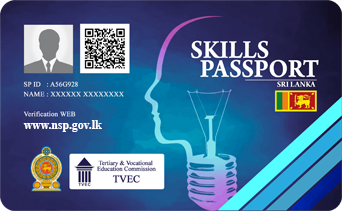
Skills Passport
Sri Lanka

A Gateway to Skills Recognition

Apply today
WHAT IS THE SKILLS PASSPORT?
 The SKILLS PASSPORT is a comprehensive portfolio of skills and qualifications of a
worker, acquired informally, along with references. This enables both employers
and workers of Sri Lanka to compare the skills with various skills assessment frameworks.
It is essentially a "gateway" to finding a job and accessing further training
for re-skilling and up-skilling.
The SKILLS PASSPORT is a comprehensive portfolio of skills and qualifications of a
worker, acquired informally, along with references. This enables both employers
and workers of Sri Lanka to compare the skills with various skills assessment frameworks.
It is essentially a "gateway" to finding a job and accessing further training
for re-skilling and up-skilling.
This system of documentation will ensure the skills, expertise and experience of a worker is recorded in a methodical manner, both within and across sectors.
The SKILLS PASSPORT can be linked with a Recognition of Prior Learning (RPL) platform, that helps recognize informally acquired knowledge, skills and competencies through formal assessments and certifications.
The Skills Passport provides benefits to all it's stakeholders
WORKER
Skills and experience obtained informally can be assessed and certified. Creates opportunities for entrepreneurship and higher learning. Enables upward mobility in employment, which leads to better wages and working conditions.
EMPLOYER
Facilitates to recruit the right person for the job with the specified skill set. Unlocks access to workers with international exposure.Enables retention of workers for longer periods leading to less time and costs spent on recruiting.
GOVERNMENT
Enables to classify and streamline workers by skill type and bridge the gaps in the labour market both locally and overseas. Assists with long term skills planning for the economy; facilitates the matching of skills to opportunities for future employment creation.
About Us
The successful reintegration of migrant workers once they return to Sri Lanka relies on the workers providing evidence of their expertise and experience acquired overseas. Furthermore, a worker's ability to secure employment is linked with their skills and competencies. Presenting proof of expertise and experience acquired can be difficult for low and semi-skilled returnee migrant workers and workers in Sri Lanka. Although Sri Lanka has an established national skills assessment system, there is no systematic method of recognizing the skills of workers. As a result, such workers lose out on opportunities for obtaining employment in Sr Lanka with an attractive pay and decent work conditions, including the potential for upwards mobility.
In light of the above, the Tertiary and Vocational Educational Commission (TVEC) of the Ministry of Skills Development, Employment and Labour Relations, together with The Employers' Federation of Ceylon (EFC) and the International Labour Organization (ILO) introduced the Skills Passport, having identified the need for a fortified skills recognition system to assist returnee migrant workers and workers in Sri Lanka become more visible to potential employers in Sri Lanka.
The Skills Passport is a common platform through which a migrant worker's or a worker's in Sri Lanka, compatibility with a vacancy can be assessed together with the detailed history of the worker's core competencies and employment history. The worker can acquire exemptions from courses or modules already completed.
Tertiary and VOCATIONAL Educational Commission
TVEC
The Tertiary and Vocational Education Commission was established in 1991 as the apex body in the technical and vocational education and training sector under the provisions of the Tertiary and Vocational Education Act No 20 of 1990. Its primary responsibility is policy formulation, planning, quality assurance, coordination and development of tertiary and vocational education in the country.
The employers' federation of ceylon
efc
The Employers’ Federation of Ceylon was established in 1929 as an organization of employers dealing with labour and social issues in Sri Lanka. It is today the principal organization of employers, promoting employer interests at national level, especially focusing on industrial relations and labour law. The EFC possesses extensive expertise and skills to address the needs of employers in the domain of Labour Law, Employment and Industrial Relations.
INTERNATIONAL LABOUR ORGANIZATION
ILO
The only tripartite U.N. agency, since 1919 the ILO brings together governments, employers and workers of 187 member States , to set labour standards, develop policies and devise programmes promoting decent work for all women and men.
